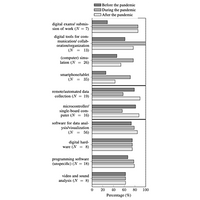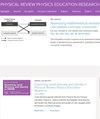Physics lab courses under digital transformation: A trinational survey among university lab instructors about the role of new digital technologies and learning objectives
IF 2.6
2区 教育学
Q1 EDUCATION & EDUCATIONAL RESEARCH
Physical Review Physics Education Research
Pub Date : 2023-11-20
DOI:10.1103/physrevphyseducres.19.020159
引用次数: 0
Abstract
[This paper is part of the Focused Collection on Instructional labs: Improving traditions and new directions.] Physics lab courses permanently undergo transformations, in recent times especially to adapt to the emergence of new digital technologies and the COVID-19 pandemic in which digital technologies facilitated distance learning. Since these transformations often occur within individual institutions, it is useful to get an overview of these developments by capturing the status quo of digital technologies and the related acquisition of digital competencies in physics lab courses. Thus, we conducted a survey among physics lab instructors () at German, Finnish, and Croatian universities. The findings reveal that lab instructors already use a variety of digital technologies and that the pandemic particularly boosted the use of smartphones and tablets, simulations, and digital tools for communication, collaboration, and organization. The participants generally showed a positive attitude toward using digital technologies in physics lab courses, especially due to their potential for experiments and students’ competence acquisition, motivational effects, and contemporaneity. Acquiring digital competencies is rated as less important than established learning objectives, however, collecting and processing data with digital tools was rated as an important competency that students should acquire. The instructors perceived open forms of labwork and particular digital technologies for specific learning objectives (e.g., microcontrollers for experimental skills) as useful for reaching their learning objectives. Our survey contributes to the reflection of what impact the emergence of digital technologies in our society and the COVID-19 pandemic had on physics lab courses and reveals first indications for the future transformation of hands-on university physics education.

数字化转型下的物理实验课程:一项关于新数字技术和学习目标作用的大学实验室教师的全国性调查
本文是《教学实验室:改进传统与新方向》集中文集的一部分。近年来,物理实验课程不断发生变化,特别是为了适应新数字技术的出现和COVID-19大流行,数字技术为远程学习提供了便利。由于这些转变经常发生在个别机构内,因此通过捕获数字技术的现状和物理实验室课程中相关的数字能力获取来概述这些发展是有用的。因此,我们对德国、芬兰和克罗地亚大学的物理实验室教师(N=79)进行了调查。调查结果显示,实验室教师已经在使用各种数字技术,大流行尤其促进了智能手机和平板电脑、模拟以及用于通信、协作和组织的数字工具的使用。参与者普遍对在物理实验课程中使用数字技术持积极态度,特别是考虑到数字技术在实验、学生能力习得、激励效应和时代性方面的潜力。获得数字能力被认为不如既定的学习目标重要,然而,使用数字工具收集和处理数据被认为是学生应该获得的重要能力。教师们认为开放的实验形式和特定学习目标的特定数字技术(例如,用于实验技能的微控制器)有助于实现他们的学习目标。我们的调查有助于反映数字技术在我们社会中的出现和COVID-19大流行对物理实验课程的影响,并为未来实践大学物理教育的转型揭示了初步迹象。
本文章由计算机程序翻译,如有差异,请以英文原文为准。
求助全文
约1分钟内获得全文
求助全文
来源期刊

Physical Review Physics Education Research
Social Sciences-Education
CiteScore
5.70
自引率
41.90%
发文量
84
审稿时长
32 weeks
期刊介绍:
PRPER covers all educational levels, from elementary through graduate education. All topics in experimental and theoretical physics education research are accepted, including, but not limited to:
Educational policy
Instructional strategies, and materials development
Research methodology
Epistemology, attitudes, and beliefs
Learning environment
Scientific reasoning and problem solving
Diversity and inclusion
Learning theory
Student participation
Faculty and teacher professional development
 求助内容:
求助内容: 应助结果提醒方式:
应助结果提醒方式:


